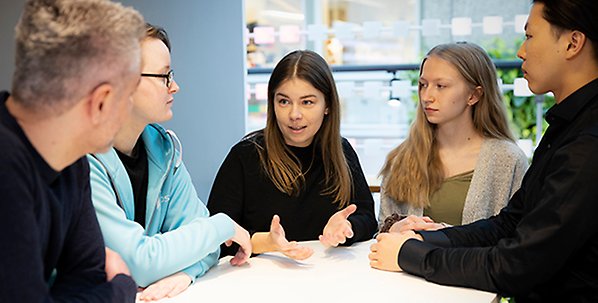Popular course focuses on Drugs in the environment
Current research shows how pharmaceuticals affect our environment. Now the Faculty of Pharmacy has gathered several key organisations to build sustainable networks between a new generation of experts and their future employers.

Modern drugs help us to live longer and healthier lives, but they can also be harmful for the environment. Through waste-water, active substances reach nature and can, in the worst case scenario, have a negative impact on entire ecosystems. In a highly quoted study of insects in the Fyris river, researchers at the Faculty of Pharmacy identified traces of 33 different pharmaceutical substances, a discovery that empasized the need to increase our knowledge about sustainable use of drugs.
“We are facing a challenge that require joint efforts by many stakeholders for years to come. We involved a wide range of organisations already in 2021, when we launched our elective course Drugs in the environment. Today, our course is still unique in its kind with an increasing number of applicants and inspiring commitment from both participants and lecturers,” says Johanna Villén, PhD student at the Department of Pharmacy.
The course combines expertise from, among others, the Swedish Medical Products Agency, the Trade association for pharmaceutical industries, Apoteket, the Swedish University of Agriculture and, in particular, Uppsala University's research environments in pharmacoepidemiology and social pharmacy. This ensures access to expertise about the drug’s environmental impact throughout its entire life cycle as well as the latest progress in frontline research: Most recently, a study analysing the use of analgesics around lake Mälaren revealed high amounts of diclofenac, an active substance that do not decompose in traditional wastewater treatment plants.
“Even though everyone realises that measures are necessary to reduce the environmental burden of pharmaceuticals, these must be assessed against medical needs. Therefore, our group is engaged in a network including the Swedish Drug & Therapeutics Committees and the Swedish National Association of Water Supplies (Svenskt Vatten). We also collaborate with the Knowledge Centre on Pharmaceuticals in the Environment and have contacts beyond Sweden's borders. For example, we hope to, together with researchers in Finland and the Baltic countries, offer the course Drugs in the environment in the entire Baltic Sea Region in order to spread knowledge and awareness over an even larger geographical area," says Björn Wettermark, Professor of Pharmacoepidemiology.
FACTS
- The course Drug in the environment is given full-time in autumn and spring semester at BMC
- The course is developed in collaboration with the Swedish Medical Products Agency's Knowledge Centre on Pharmaceuticals in the Environment.
LEARN MORE
- Läkemedel i miljön
- Drugs in the environment (7.5 cr)
- The Faculty of Pharmacy freestanding courses
- Research in Pharmacoepidemiology at Uppsala University
CONTACT
Johanna Villén, course leader
Department of Pharmacy
johanna.villen@farmaci.uu.se
Text: Magnus Alsne, foto: Mikael Wallerstedt
